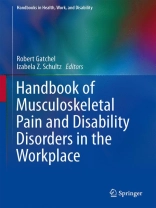This book addresses the complexity of preventing, diagnosing, and treating musculoskeletal pain and disability disorders in the workplace. Divided evenly between common occupational pain disorders, conceptual and methodological issues, and evidence-based intervention methods, this comprehensive reference presents current findings on prevalence, causation, and physical and psychological aspects common to these disorders. Attention is given to working-world concerns, including insurance and compensation issues and AMA guidelines for disability evaluations. Also, specialized chapters offer lenses for understanding and administering the best approaches for treating specific pain disorders, and explore what workplaces can do to accommodate affected employees and prevent injuries from occurring in the first place.
İçerik tablosu
PART I THE MOST COMMON OCCUPATIONAL MUSCULOSKELETAL PAIN AND DISABILITY DISORDERS.- Occupational Musculoskeletal Pain and Disability Disorders: An Overview.- Back Pain.- Cervical Pain.- Upper Extremity Pain.- Lower Extremity Pain.- Chronic Widespread Pain.-The Problem of Whiplash Injuries: Etiology, Assessment and Treatment.- New Trends of Musculoskeletal Disorders in the Military.- PART II CONCEPTUAL AND METHODOLOGICAL ISSUES.- Search Engines/Resources Available to Obtain the Latest Prevalence and Cost Data for Occupational Pain and Disability Disorders.- Epidemiology of Musculoskeletal Disorders and Workplace Factors.- Acute, Postacute and Chronic Disorders: Differences and Potential Recovery Outcomes.- Psychological and Psychiatric Sequelae of Chronic Musculoskeletal Disorders.- Preemployment and Preplacement Screening of Workers to Prevent Occupational Musculoskeletal Disorders.- Medicolegal Issues Involved in Occupational Musculoskeletal Injuries.- Workers’ Compensation and Other Disability Insurance Systems Involved in Occupational Musculoskeletal Disorders.- Approaches to the Quantitative Physical and Functional Capacity Assessment of Occupational Musculoskeletal Disorders.- Current American Medical Association Guidelines for Evaluating Musculoskeletal Impairment and Maximum Medical Impairment.- PART III INTERVENTION APPROACHES AND TECHNIQUES.- Traditional Medical Intervention Approaches to Musculoskeletal Disorders: A Review.-The Biopsychosocial Approach to the Assessment and Intervention for Musculoskeletal Disorders.- The Interdisciplinary Treatment Approach: The Key Components for Success.- Early Intervention to Prevent the Development of Chronic Musculoskeletal Pain and Disability Disorders.- A Review of Self-Management Techniques for Musculoskeletal Pain.- Work Accommodation Methods for Occupational Musculoskeletal Injuries.- Models of Return-to-Work for Musculoskeletal Disorders: An Update.- Vocational Assessment and Training for Patients with Chronic Occupational Musculoskeletal Disorders.- Real-effectiveness Medicine in Musculoskeletal Disorders.- Future Research Directions for Preventing and Treating Occupational Musculoskeletal Disorders.
Yazar hakkında
Dr. Robert Gatchel is the Nancy P. & John G. Penson Endowed Professor of Clinical Health Psychology and the Chairman of Psychology, College of Science at the University of Texas at Arlington. He also holds two other positions: clinical research director at the Eugene Mc Dermott Center for Pain Management at the University of Southwestern Medical Center at Dallas, and director of biopsychosocial research at the University of North Texas Health Science Center. He is the author 23 books, 106 book chapters and 318 scientific research articles. His clinical research, most of it in the areas of the etiology, assessment and treatment of pain and disability, has been continuously funded over the past 30 years from grants from the National Institutes of Health (NIH). He also received a prestigious Research Scientist Award from NIH and has been honored with awards from various organizations such as the American Psychological Association, the American Pain Society, the American Academy of Pain Management, the International Association for Dental Research, the International Society for the Study of the Lumbar Spine, the North American Spine Society, to name a few.
Dr. Izabela Z. Schultz is Professor of Rehabilitation Psychology and Director of Graduate Program in Vocational Rehabilitation Counselling in the Department of Educational and Counselling and Special Education at the University of British Columbia. Dr. Schultz is doubly board certified as diplomate in clinical psychology, American Board of Professional Psychology and as diplomate of the American Board of Vocational Experts. She has received international awards for her innovative research on prediction of occupational disability and professional leadership awards for major contributions to medico-legal aspects of rehabilitation psychology. She has published several books and numerous seminal papers and book chapters in the field of occupational disability and rehabilitation. She is an editor of the Work and Disability Section of Springer’s
Psychological Injury and the Law and a founding member of this international journal. Recently, she completed, with Dr. Sally Rogers, the pioneering Work Accommodation and Retention in Mental Health (Springer). Dr. Schultz is also a co-chair of the American Psychological Association’s Task Force on Assessment and Treatment of Persons with Disabilities. She has been leading development of best-evidence-informed practice guidelines in early musculoskeletal pain interventions, in work accommodation and retention in mental health, and in assessment and treatment of persons with disabilities.












